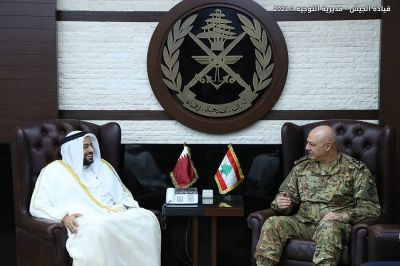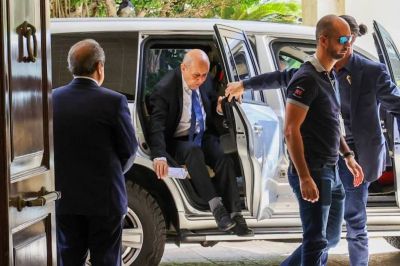FPM head Gebran Bassil during a speech, Sept. 24, 2023, in Akkar, north Lebanon. (Courtesy of Michel Hallak)
BEIRUT — Free Patriotic Movement chief MP Gebran Bassil said Sunday that "no one can come" between his party and the Lebanese army. The remark came amid tensions between Bassil and army Gen. Joseph Aoun, with several analysts say the army chief could be the next president of the Republic, backed by several foreign powers.
Lebanon has been without a president since October 31, 2022, when FPM-founder Michel Aoun left office. Bassil has previously stated that he does not back Joseph Aoun, one of the unannounced candidates for the presidency, to take the executive office.
Joseph Aoun said Sept. 18 that Lebanon's presidency "does not concern" him, despite months of chatter by politicians and media that he might be in the race.
"Our party has a solid equation derived from the slogan of honor, sacrifice, and loyalty [the Lebanese army slogan], and no one can come between FPM and the Lebanese army. Figure out something else to deal with," Bassil said in his speech in Akkar, during a party event in which Michel Aoun took part.
Hezbollah and the Amal Movement support Marada Movement leader Sleiman Frangieh for president while the opposition camp and FPM back International Monetary Fund (IMF) senior official Jihad Azour. Local media have suggested recently that Joseph Aoun could also be a candidate, as Frangieh and Azour have been unable to secure the needed votes to be elected.
The Group of Five (France, USA, Saudi Arabia, Qatar, and Egypt), has met three times in recent months to discuss Lebanon. Once very influential on the Lebanese scene, Saudi Arabia has distanced itself from the country in recent years, notably to mark its disapproval of Hezbollah's elevated profile.
The latest meeting of the quintet, following those in Paris and Doha, took place Tuesday on the sidelines of the UN General Assembly. No communiqué was issued, and the roundtable was reportedly the scene of disagreement between participating powers. Riyadh and Washington reportedly demanded that Paris set a timetable for its initiative in Lebanon, led by Jean-Yves Le Drian, and threatened sanctions against those responsible for the stalemate.
Decentralization
In his speech, Bassil also talked about decentralization, about which he is currently in negotiations with Hezbollah.
"I know very well that the law of administrative decentralization and a state asset fund, like other files, won't happen without an agreement among Lebanese. The only way to reach an agreement is dialogue, that is why the slogan of the general [Michel Aoun] was always that dialogue is the only way to salvation.
"FPM cannot be against any valuable and serious dialogue," Bassil also said, amid a proposal from Parliament Speaker Nabih Berri for a week-long dialogue meeting before an open electoral session in Parliament. Many opposition parties, however, reject this option. FPM has at times voiced support for this initiative, while criticizing it at other times.
"We did not put conditions but stated the circumstances in which a dialogue would be successful in order to elect a president in accordance with a program," Bassil said, "because a program is more important than a person in these times. Forcing something onto us does not work."
Bassil criticizes Mikati
He also criticized caretaker Prime Minister Najib Mikati for his role in dealing with the Syrian refugee crisis since 2011 when he was Prime Minister.
"We have a prime minister that was in office during the first wave of migration in 2011 and the second wave in 2023 12 years later, and he didn't do anything other than speak. Should we make him Prime Minister again?" Bassil said and went on to apparently make a jab at Joseph Aoun. "We have politicians in power and security officials who are silent and are facilitators of migration today. They are being lenient on opening the land borders for Syrians in Lebanon and are closing the maritime borders to prevent them from getting out. Should we elect one of them as a president?"
During a tour of the Bekka's Hermel region Friday, the army chief implicitly criticized Bassil, referring to the international aid received by the troops.
"Some people say that this aid is humiliating. To those I say, it's this aid that keeps the army going," said General Aoun.
"Some people criticize the army and question its role in protecting the borders, while they don't even bother to send their ministers to attend a cabinet meeting, which was devoted to a single issue: the question of Syrian migrants."
Lebanese Forces (LF) leader Samir Geagea Sunday ruled out the possibility of a presidential election in the near future, despite Saudi and Qatari efforts to break the political deadlock that has persisted since Michel Aoun's presidential term ended last October.
In an interview with the online media platform Trend Beirut, published Sunday, the Christian leader "ruled out the possibility of holding presidential elections in the near future, despite Saudi and Qatari efforts, because the worm is in the fruit," referring to internal differences, the site notes, in the absence of consensus on a candidate.
Saudi ambassador to Lebanon Walid Bukhari said Saturday that "lasting solutions must come from within Lebanon, not from abroad," insisting that the presidential election is "a sovereign matter that the Lebanese must decide for themselves." He made these remarks ahead of Qatari Minister of State for Foreign Affairs Mohammad ben Abdel Aziz al-Khulaïfi's planned visit to Beirut in early October.

